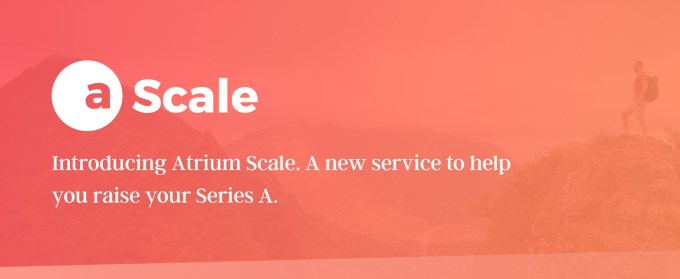Justin Kan is qualified to teach you how to pitch, and isn’t shy about it. Having raised about $90 million for a few companies and sold his startup Twitch to Amazon for almost a billion dollars, not being shy is actually part of what Kan teaches. His legal services startup Atrium today officially launches Atrium Scale, its free Series A fundraising workshop that’s helped 8 startups raise $100 million since it started in beta 5 months ago. The two-day in-person seminar includes pitch coaching, intros to investors and mentors, follow-up online pitch deck help, legal advice, Amazon and Google Cloud credits, and tax and accounting services.
I went through Atrium Scale myself, pretending I was the founder of a hypothetical startup that replaces your phone’s Contacts app. While the lectures were full of valuable tips, you can get a lot of those from instructional blog posts by Kan and other VCs. But the small group Q&A and coaching with entrepreneurs who’d successfully raised did a remarkable job of improving attendees pitches and the esoteric song-and-dance necessary to get investors to part with their cash.

Atrium co-founder Justin Kan
Here’s a breakdown of how Atrium Scale works:
- When: Once per quarter over a saturday and sunday
- Where: Atrium’s offices in downtown San Francisco
- How Much: Free, but Atrium hopes you’ll end up using its legal services
- Who: Startups planning to raise their Series A in the next six months, the sooner the better, who fly themselves in from all over the world
- Who Gets In: Atrium selects the 10 percent of applicants most ready for venture funding. Applications can be submitted here
- Investors Involved To Date: Sequoia, General Catalyst, Accel, Venrock, Social Capital, Signia, KPCB, Lightspeed
- Mentors: Justin Kan (Atrium, Twitch), Holly Liu (Kabam, Y Combinator), James Richards (Teleborder, TriNet), Andrew Trader (Zynga), Ashu Desai (Make School)
What Atrium Scale Teaches
The Atrium Scale method revolves around the concepts of how to pitch and when. While there are plenty of ways to show off a business, Kan recommends a calculated approach to storytelling. “When should you raise? When you can convince investors to give you money and when cash is the constraint to scaling your business” Kan said to kick off our program.
The Song
“It all starts with a narrative — 99 percent is the work of building the business, but an important 1% is convincing people” Kan relays.
First, explain how the world is a certain way. Describe the problem, why it’s big, and who in the market would pay for a solution. Demonstrate that you’re an expert.
Second, explain how the world is changed by your solution to the problem. Frame what’s possible for businesses or consumers once they have your product.
Third, explain how the world is new now that your solution exists. Provide metrics on traction and mechanisms for growth, and show why your team is uniquely equipped to succeed. Identify adjacent markets your product will conquer.

Unlike the frothy days of yore, “people are no longer willing to lose money on a per unit basis” says Kan. VCs will demand to understand your unit economics and scalable customer acquisition strategy that turns cash invested into more cash earned.
Perhaps the most important part of the pitch is practice, though. Pitch to fellow founders, investors, or angels but explicitly tell them you want feedback, not money. Running through the pitch over and over boosts confidence, A/B tests narratives, and unearths questions. Know your numbers by heart so you always seem sure of where the business is heading, and define a personal pitching style that plays to your personality strengths.
Kan says it all comes down to making investors see your vision for how you’re going to become a massive company.
Atrium Scale helps here by letting you pitch in groups as well as one-on-one with mentors. Simply being surrounded by people all trying to improve creates an atmosphere conducive to progress rather than getting defensive about criticism. There could be better homework or takeaway materials to help startups continue to improve after the workshop ended. But I heard entrepreneurs work out kinks and trim off tangents that could have derailed their pitch during a real meeting.

The Dance
Where Atrium Scale shined brightest was digging into the cadence of the fundraising process. Anyone can work out a decent pitch in their garage, but it takes special know-how to navigate turning that pitch into money in the bank. This is the kind of in-group knowledge that often makes it tough for outsiders to break into Silicon Valley.
You should pitch wide, planning to talk to at least 10 to 20 investors but knowing it can take 100 ‘no’s to get a ‘yes’. Pick investors not based on their firm’s name recognition but their expertise and track record in your industry. Contact investors at least three to four weeks out and schedule meetings in as rapid succession as possible. The goal is to be able to get term sheets back at the same time so you can play firms off each other and pick the best deal.

You’ll start with single partner meetings. You’ll hear back within 24 to 48 hours if they go well, and you can assume they didn’t if you don’t hear back soon. Those that like you will set up multi-partner meetings, and you should ask them what their colleagues will want to know. If that goes well you’ll be brought in for an exhaustive full-partnership pitch where they’ll try to poke holes in your business. Lots of questions means lots of interest, while few questions and VCs bored on their phones means you’re toast.
If the partnership believes in you, you’ll quickly receive a term sheet, but you don’t have to sign it right away. Since you can’t fire your investors, be sure to call their references so you’re sure which you want to work with forever. This also gives you time to go back to other firms you’ve pitched. Don’t say who it’s from but use your existing term sheet as leverage to get them to give you one or one with a better deal.
Aim for a lead investor that will put in at least 25 percent of the round volume and then fill it out with other firms, strategics, and angels. Know that the median delay for investor due diligence is 41 days, so make sure you have enough runway to wait that long after you complete the pitch process. The fundraise should last you 12 to 18 months, but be careful since your spending will expand to take up what in the bank. Be ready by then to show you’ve hit new milestones that de-risk your business.

The program also reviewed more advanced topics like raising money from strategic investors, equity vs SAFE financing, crooked deal terms like ratchets and liquidation preferences, and how to manage your board. That one-size-fits all info is certainly helpful, but thanks to the small class size, Atrium Scale’s Q&As let founders get answers to industry-specific questions and their own edge cases.
There are plenty of people looking to help startups in Silicon Valley, but few are giving away this high quality of education for free. Accelerators can charge 7 percent of equity and advisors can charge a percentage point or two. That can be worth a lot if the startup does well. Consultants want cash that pre-A startups rarely have. But Atrium is merely looking for lead generation and it needs them to raise money to be able to afford its legal services. That aligns the workshop well with the outcomes for the companies.
If you have a dumb business idea, no amount of turd polishing will get you legitimate funding. But for startups on to something that just need help communicating, Atrium Scale could be a quick and cheap way to boost their chances of getting picked from the crowd.
from Startups – TechCrunch https://ift.tt/2H8E4kQ
via IFTTT
No comments:
Post a Comment
Thank You for your Participation